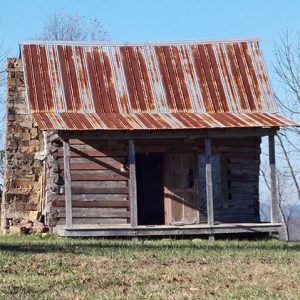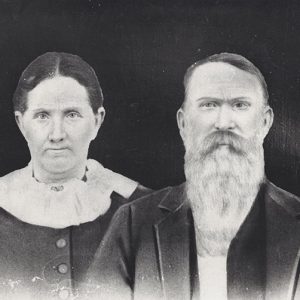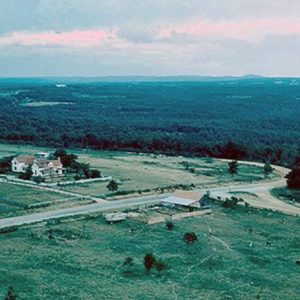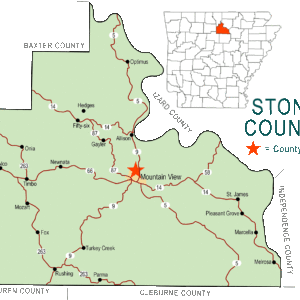calsfoundation@cals.org
Rushing (Stone County)
Rushing is located in Turkey Creek Township on Highway 9 just south of where Highway 263 merges with it for a short distance traveling east. Rushing is in the rugged hills of the Ozark Mountains, with rocky soil unsuited for large crops. Because of the difficulty in making a living from farming there and because of its isolation, Rushing did not attract settlers until after the Civil War. Only a few hunters and trappers ventured through the wooded mountains, which were full of small game such as squirrels and rabbits as well as deer and bears. Turkey Creek had plentiful fish and beavers.
Settlers began subsistence farming along Turkey and Brushy creeks following the Civil War. The passage of the Homestead Act in 1862 encouraged a few hardy farmers to make claims along the Little Red River at Meadowcreek (Stone County) about ten miles from Rushing. Gradually, some of the pioneer agrarians inched their way up the mountain to Rushing and began eking out a living from the rocky soil with a few small crops. Corn was a favorite crop, and sometimes moonshine stills operated in the woods. Settlers hunted, gardened, and also gathered wild plants and berries such as poke sallet, muscadines, and persimmons.
The first postmaster was Ephraim Owen “Eaf” Rushing. As a Union army sergeant, he had fought in the Battle of Vicksburg. Rushing had settled in the region along with wife Barsheba Elizabeth Holland Rushing (who, like Ephraim, was born in Kentucky) and family around 1873. Census reports from 1850 and 1870 show he was living in Johnson County, Illinois, before moving to Arkansas. The post office was named for him and was part of his general store. It opened on June 19, 1882, superseding the short-lived one that had just closed in nearby Turkey Creek (Stone County). Ephraim Rushing and his wife are buried in Rushing Cemetery.
Perhaps the most notable person whose remains are interred in the Rushing Cemetery is James Hiram (Jim) Berry of Turkey Creek, known as the man who killed the notorious Civil War bushwhacker and outlaw Bill Dark. Dark hid out in Dark Holler at Timbo (Stone County) and in the Rorie Cave near Onia (Stone County). He terrorized the hill people until early 1863, when the teenaged Berry shot him with a cap-and-ball pistol in an encounter on the middle fork of the Little Red River a few miles upriver from present-day Shirley (Van Buren County). Folk musician Jimmy Driftwood of Timbo told the story in his song “The Ballad of Jim Berry.”
Another pioneer grave in Rushing Cemetery is that of Civil War veteran Jesse Files, whose grandfather Jeremiah Benton Files served in the Revolutionary War from South Carolina. Files was at the Battle of Cowpens with his father and his brother, Adam J. Files, and was wounded by a sword. Jesse Files served in the Union army during the Civil War, as did two of his sons, who both died in the war. File Hill in Turkey Creek Township is named for this family.
A public school existed in Rushing by the 1920s. The Rural Special School was created in 1946 in Fox (Stone County). All the country districts in this wooded mountainous part of the county—Fox, Meadowcreek, Mozart (Stone County), Parma (Stone County), Rushing, Sunnyland (Stone County), and Turkey Creek—merged to form Rural Special. In July 2004, under Act 60 of the Arkansas General Assembly, Rural Special consolidated with the Mountain View Public Schools but was allowed to keep its own campus.
This part of the Ozarks in Stone and Van Buren counties played a significant role in the back-to-the-land movement, headed locally by two brothers, David and Wilson Orr, who consolidated their assets to buy 1,500 acres along Meadowcreek and the Little Red River. The two brothers moved their families to the area in June 1979 and began building a community they believed would supply all its own food and energy. This effort became known as the Meadowcreek Project. Meadowcreek is a three-mile-long valley rimmed on both sides by high, rocky bluffs rising 500 feet above the canyon floor, with rich farmland and 1,200 acres of mixed hardwoods and evergreens. There is also abundant water.
Rushing is in such an isolated part of the Ozarks that it failed to develop beyond a store or two (one with a post office), a church, the cemetery, and a handful of farmers, ranchers, and woodsmen. A few homes, the Antioch General Baptist Church, and Rushing Cemetery are all that are left of the town in the twenty-first century; the Rushing Post Office closed in 1971. Residents farm and/or raise livestock, and a few have jobs in nearby Shirley or Clinton (Van Buren County).
For additional information:
Davis, Michael A. “The Legend of Bill Dark: Guerrilla Warfare, Oral History and the Unmaking of an Arkansas Bushwhacker.” Arkansas Historical Quarterly 58 (Winter 1999): 414–429.
Driftwood, Jimmy. “Voice of the Hills.” Mountain View Herald, January 15, 1953.
“Meadowcreek Project: A Model of Sustainability in the Ozarks.” Mother Earth News (March/April 1982). Online at http://www.motherearthnews.com/nature-and-environment/sustainability-model-zmaz82mazglo.aspx (accessed October 6, 2020).
Kenneth Rorie
Van Buren, Arkansas
 Hinkle Cabin
Hinkle Cabin  Ephraim and Barsheba Rushing
Ephraim and Barsheba Rushing  Rushing House
Rushing House  Stone County Map
Stone County Map 




Jesse Files and all his brothers and cousins served in the Union army in Company L, 1st Alabama Cavalry (US).